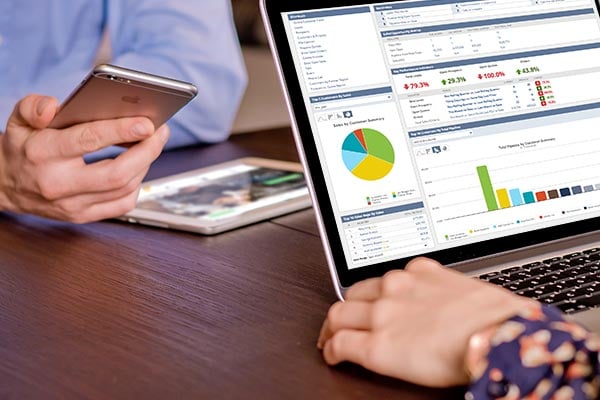Time is money. We’ve all heard the expression before, but for business owners, it resonates. Finding ways to save time through better business processes allows you to free up employees to work more strategically, increase productivity, set your business up for further growth and improve overall profitability.
We’ve worked with many businesses to implement streamlined processes that save them time and ultimately save them money. Here are our top 7 ERP time-saving tips which business are succeeding with right now and seeing some compelling savings.
1. Reducing Double-Handling of Data
One of the biggest sources of wasted time and effort within businesses is double-entry of data. It’s common for data to be read from one system and manually re-keyed into another for businesses who are working with multiple different systems which serve different purposes. Not only does this cause additional time and effort for employees, but it leaves your business open to human error which can end up costing even more time in fixing. Have a look at how many systems you’re using at the moment and which of them could be consolidated into the one business management system. Having one, single system managing all aspects of your business from CRM to invoicing, warehousing, and more can eliminate any need for double-handling of data.
2. Complex Calculations


3. Simplifying Re-ordering
Managing stock manually can be a complex task and one which doesn’t allow room for error. It’s also a bit of a balancing act, ensuring each line item of stock is re-ordered at just the right time to ensure you don’t end up with too much stock in your warehouse or too little stock to fulfil your order commitments. With the right ERP software, you’ll be able to set automatic re-ordering points with minimum and maximum stock levels which always keeps your stock at the right levels.
4. Speeding Up Your Warehouse Operations
When you have a system in place which generates picking slips, you’ll already to be leveraging process time savings and greater picking accuracy. With an ERP that’s integrated with a Warehouse Management Solution (WMS), you can drive the time savings and boost your warehouse accuracy even further. Arming your warehouse staff with handheld RFID scanners to remotely manage the pick/pack/ship process, receiving, bin put-aways, and even stock counts can be one of the biggest wins to your overall warehouse speed and efficiency. This means getting goods out to your customers quicker and being able to move more stock through your warehouse.
5. Eliminating Reporting Delays
The last time you asked someone to run a report to see your operating profit or year-to-date sales trends, how long did it take to see that report? And by the time you received it, how old was that reporting data? Hours, days, even longer? The benefit of having a cloud-based ERP system is gaining the ability to produce reports at literally the press of a button. With real-time data available the moment you need it, making agile business decisions becomes an everyday reality.
6. Out-Of-Office Access


7. eCommerce Self-Servicing
Having an online presence is vital in this day and age. But just having a presence doesn’t necessarily mean you’re leveraging time savings for your business or delivering a great experience back to customers.
With an eCommerce solution that’s integrated with your ERP system, you can give customers control of their data. They can place orders, save items for quick re-ordering, download invoices, see their order status updates, and manage their customer details without ever needing to call or email your business. That’s a lot of time saved for your employees and a great experience for customers who can access their information and updates whenever they like.
If you’re considering ERP software, get in touch to talk with a knowledgeable resource about even more ways you save your business time and money with the right solution. There’s no time like the present!
After more information on how an all-in-one ERP solution can benefit your business? Get your free eBook: Cloud ERP System for Enterprises – Key Considerations Guide









